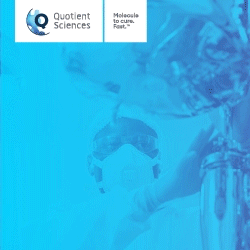issues
October 2024
Download PDFCOVER
DRUG DELIVERY - Advancements in Transdermal Delivery Systems: A Focus on Invisicare® Technology for Obesity Treatment
James A. Roszell, PhD, and Doreen McMorran demonstrate how this technology has demonstrated potential in the transdermal administration of glucagon-like peptide-1 (GLP-1) agonists and cannabinoid receptor type 1 (CB-1) antagonists, primarily targeting obesity management and other conditions requiring glucose regulation.
FEATURES
DRUG DELIVERY - Advancements in Transdermal Delivery Systems: A Focus on Invisicare® Technology for Obesity Treatment
James A. Roszell, PhD, and Doreen McMorran demonstrate how this technology has demonstrated potential in the transdermal administration of glucagon-like peptide-1 (GLP-1) agonists and cannabinoid receptor type 1 (CB-1) antagonists, primarily targeting obesity management and other conditions requiring glucose regulation.
FORMULATION FORUM - Lyophilization Technology - An Enabler for Stable Formulations of Small & Large Molecules
Shaukat Ali, PhD, and Jim Huang, PhD, explain how lyophilization or freeze-drying technology is one of the ideal methods that leads to immobilization of drug and other components that remain in solid or powder state for extended periods without concerns of degradation, and how it has also been applied to improve drug solubility by means of amorphous solid dispersions.
ARTIFICIAL INTELLIGENCE - Deciding Whether to Automate With AI? 6 Key Practices to Consider
Dan Milczarski believes before deciding if or how to use AI in life sciences, it’s critical to weigh the pros and cons. There is a vital need to customize constantly evolving AI applications and innovations to create tailored, effective technologies that reflect life science organizations’ regulatory and organizational frameworks.
THERAPEUTIC FOCUS - Pushing Boundaries in Idiopathic Pulmonary Fibrosis Clinical Research
Laura Iliescu, MSc, and Justin Herman, MD, explore the changing landscape of IPF and how biopharmaceutical companies developing novel treatments can effectively navigate the emerging challenges in a rapidly evolving IPF landscape.
CONTROLLED RELEASE - How Advanced Excipient Knowledge is Shaping the Future of Controlled-Release Formulations
Matthias Knarr, PhD, and True Rogers, PhD, review the latest insights behind CR formulations using HPMC excipients and how HPMC substitution specifically can assist formulators in developing cutting-edge CR delivery systems with differentiated performance.
EXECUTIVE INTERVIEW - Respiratory Drug Development: Lonza Experts Share Trends & Key Takeaways
Beatriz Fernandes, Principal Scientist for R&D, and Kim Shepard, Director, Technology Head Respiratory Delivery, at Lonza, discuss their presentations at RDD 2024, current trends, and the future of the inhalation space.
TOPICAL DELIVERY - Direct Effects™ Perampanel (FYCOMPA®): First Topical Anticonvulsant to Treat Seizures, Headache & Other Symptoms in Epilepsy
Ronald Aung-Din, MD, Sasha Feygin, and Daniele La Rosa say Direct Effects topical perampanel is effective in treating headache and other neurological symptoms commonly encountered in patients with seizures and other conditions in which neuronal instability and hyper-excitability exist.
LYOPHILIZATION - Lyo 101: Challenges & Solutions in Lyophilization Cycle Development
Matt Bourassa says as companies continue to pioneer new molecules and treatments, molecule stability has emerged as a persistent detriment to every iteration, and increasingly, lyophilization is an attractive path to a sustainable, repeatable solution.
FORMULATION DEVELOPMENT - Practical & Purposeful: Creating Novel Compounds Via Rediscovery R&D & Cannabinoid Molecules
Mark Bleackley, PhD, says as time goes on, more companies will discover the benefits of drug repurposing – and how to successfully use such strategies to develop new, patentable drug products. In fact, repurposing could be exactly what’s needed to enable pharmaceutical and biotechnology companies to more swiftly develop treatments for indications with significant unmet medical needs.
SMI TECHNOLOGY - How Soft Mist Inhalers Support Improved Biopharma Drug Delivery
Nicolas Buchmann, PhD, explores the opportunities and challenges of developing biologic formulations for delivery via SMIs and discusses the importance and impact of partnerships between inhalation device development experts when it comes to facilitating the innovation needed to expand the suitability of SMIs to a wider range of biopharma formulations.
PRECLINICAL/CLINICAL STUDIES - Preclinical Toxicology vs Clinical: Key Considerations in Using Lipid-Based Formulations
Anette Müllertz, PhD, Grace Furman, PhD, and Lisa Caralli say developers should first understand the developability challenges for their molecule, then a toolkit of enabling technologies can be identified to overcome those factors and individually leveraged to create fit for purpose formulations for use in preclinical and clinical studies.
PLATFORM TECHNOLOGY - Developing Novel Antisense Oligonucleotides for Neurodegenerative Diseases
Scott Schobel, MD, and Nicole Datson, PhD, are hopeful their novel platform for targeting disease-causing RNA with multiple modulating approaches will lead to major advances in treating genetic disease and improving the lives of patients and their families in the years ahead.










